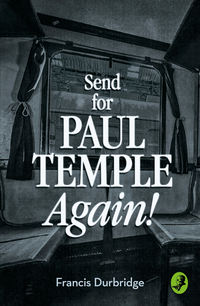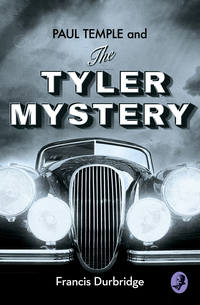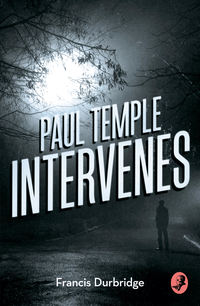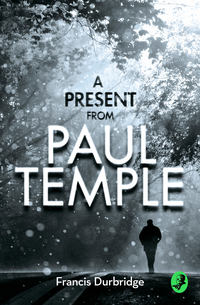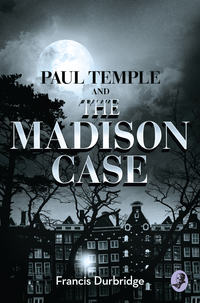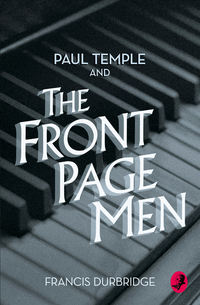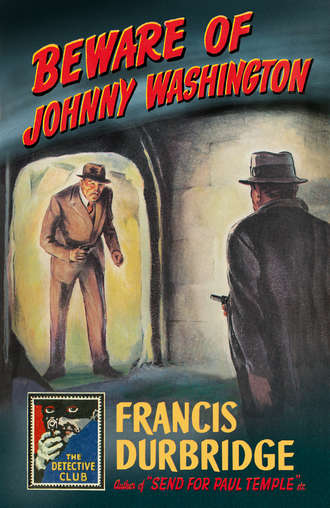
Полная версия
Beware of Johnny Washington: Based on ‘Send for Paul Temple’
‘Where’s the catch?’ repeated Sir Robert, turning the card over and peering at it again.
‘In the first place,’ replied Locksley, ‘Johnny says he has never set foot in Gloucester in his life.’
‘Well, you know what a confounded liar the fellow is,’ retorted Hargreaves. ‘Have you checked on him at all?’
‘The jewellers say they have never set eyes on him,’ said Locksley.
‘I don’t suppose they’ve set eyes on any of the gang that did the job,’ grunted the commissioner. ‘Did you find out if he had an alibi?’
‘Yes, he had an alibi all right. He was up in Town for the night to see a girl named Candy Dimmott in a new musical—seems he knew her in New York. He stayed at the St Regis—got in soon after midnight. According to the doctor, the night watchman had been chloroformed about that time—and the constable found him soon after 2 a.m. So Washington simply couldn’t have been in Gloucester then.’
‘You never can tell with that customer,’ said Kennard dubiously.
‘I questioned the night porter at the St Regis—he knows Washington well, and swears he never left the place while he was on duty,’ said Locksley. He turned to his chief again. ‘There’s another thing about that card, sir.’
‘Eh? What’s that?’
‘There are no fingerprints on it. I used rubber gloves when I put it together, and whoever tore it up and put it in that waste-paper basket must have done the same. Now, if Mr Washington left that card deliberately, why should he go to the trouble of using gloves?’
‘He might have been wearing them anyhow,’ pointed out Kennard.
Locksley shrugged.
‘Yet again, if he wanted to leave a card, why tear it up?’ he demanded earnestly.
Sir Robert rested his chin on his hand and gazed thoughtfully at the fire.
‘I begin to see what you’re driving at,’ he murmured. ‘You think this card business is a plant—presumably to distract attention from the real master mind.’
‘That’s about it, sir,’ agreed Locksley. ‘Washington’s name has been in the papers several times—and there was that silly article about Johnny being the modern Robin Hood. It’s given somebody an idea.’
Sir Robert picked up a wire paper fastener and very deliberately clipped the card to the report of the Gloucester robbery.
‘You haven’t seen Washington?’ he asked.
‘No, sir. I spoke to him twice on the telephone. He seemed a bit surprised, then amused. But he helped me all he could about the alibi when he saw how serious it was.’
‘Alibi or not, I think we should keep an eye on that gentleman,’ suggested Kennard.
‘That sounds like a good idea,’ replied Hargreaves. ‘You know him fairly well, don’t you, Locksley?’
‘I certainly saw something of him in the Blandford case.’
‘All right, then you can pop down to his place and have a talk to him as soon as you can get away from here today. And if you get the slightest hint that he is the brains behind this gang, don’t take any chances. Just tell him you are rechecking his alibi.’
‘It isn’t easy to fool Johnny Washington,’ said Locksley, slipping his little black notebook back into his inside pocket.
‘I must say, sir, I’m not convinced that it is a real organization we’re up against,’ insisted Kennard. ‘What makes you so sure about that?’
Sir Robert began to pace up and down between his desk and the fireplace.
‘It’s more a hunch than anything,’ he confessed. ‘For one thing, they’ve tackled such a variety of jobs—the average safe-buster sticks to one line as a rule and goes after the sort of stuff he can get rid of without much trouble. This gelignite gang have already robbed a cinema, a bank, two jewellers and a factory office. It takes a very unusual brain to plan such a variety of jobs in a comparatively short time.’
‘A brain like Johnny Washington’s?’ queried Kennard.
Sir Robert Hargreaves did not reply.
CHAPTER II
ENTER JOHNNY WASHINGTON
CALDICOTT MANOR is a sturdy four-square white house standing about half a mile outside the village of Caldicott Green, near the junction of the main road to Sevenoaks, which is some four miles away.
From the moment he set eyes on it in an agent’s catalogue, the manor had intrigued Johnny Washington, who had been suddenly overcome with the idea of retiring into the heart of the English countryside and getting back to nature for a spell after his exciting but profitable incursions into the London underworld.
He also liked the look of Caldicott Green, with its small stream running parallel with the main street and draining into a large pool near the manor which offered possibilities for fishing, one of his favourite forms of relaxation. Mr Washington was burdened with over-large and slightly troublesome feet which debarred him from most forms of sport. Angling, however, was ideal, for it allowed him to relax at full length for long periods on sunny afternoons, taking the weight off his pedal extremities. Johnny claimed that many of his best ideas had come to him while sitting beside a placid stream, hopefully awaiting a bite that never materialized.
His enemies were wont to declare that Johnny suffered with his feet because he was too big for his boots, and there was possibly something in this accusation, for this young man from America could have bluffed his way into the secret councils of the Atomic Control Commission as nonchalantly as if he were the man who originally split the atom.
But the secret of his success lay in the fact that he never over-estimated himself; his bluffs were always a part of a coolly calculated scheme and designed for a specific purpose.
Naturally, having enriched himself to some considerable extent at the expense of a wide variety of social parasites, he had made a number of bitter enemies, so he was not in the least surprised to hear of the attempt to implicate him in the jewel robbery at Gloucester. It was by no means the first time such a thing had happened; in fact, he was often surprised that it did not occur more often.
Johnny Washington lay on the enormous settee in his drawing-room (that was what the previous tenant had called it) awaiting the arrival of his nearest neighbours, Doctor Randall and his niece, Shelagh Hamilton, with whom he had scraped acquaintance at a nearby point-to-point meeting. They had promptly invited him to lunch, and he was now about to return their hospitality. Johnny had not planned to intermingle with the local country folk, but he had to admit that the doctor and his niece rather intrigued him. The niece in particular. Shelagh, who bore not the slightest resemblance in features to her uncle, seemed right out of place in the heart of the Kent countryside. Johnny had met plenty of her type in the night spots of New York; in fact she awakened vague murmurings of nostalgia inside him.
Blonde, brittle, perfectly made-up, exquisitely manicured, Shelagh looked as if she had been born with a lipstick in one hand and a drink in the other. She had a lively turn of conversation which amused Johnny; she was a cynic to the tips of her blood-red fingernails and he liked meeting people who had no respect for those who sat in the seats of the mighty. But he found it hard to believe that she was Doctor Randall’s niece, and found it idly intriguing to speculate upon their exact relationship.
Randall was a man in his early fifties, a very energetic type, somewhat wizened by many tropical suns, for he had told Johnny that he had worked on the Gold Coast for some years before his retirement, and he certainly talked knowledgeably about certain parts of the world, so that he made a very agreeable dining companion. But there was again an air of mystery about him; he ran a couple of large cars and horses for himself and Shelagh, and to all outward appearance seemed to live at the rate of about ten thousand pounds a year.
Johnny was pondering upon these and other minor matters while he smoked one of his favourite Chesterfields, when the telephone rang in the hall, and his butler, Winwood, came in to tell him he was wanted.
Johnny had always had a yearning for the genuine type of old English butler he had seen in so many indifferent British films. He had interviewed over thirty men for the job, and Winwood came nearest to the genuine article. This was possibly because Winwood had played such a part in no fewer than sixty-eight films, and was now driven to play it in real earnest as a result of the parlous condition of the British film industry!
Winwood had carefully omitted to mention to his employer that his experience had been largely upon the sound stages of Denham and Pinewood, rather than the stately homes of England, but Johnny was not over-fussy about details of domestic routine, as long as his butler looked the part. And he delighted to watch him throw open a door and announce in nicely modulated tones as he was doing at this moment:
‘There is a Superintendent Locksley who would like to speak to you on the telephone, sir.’
Johnny gave Winwood an appreciative grin, then slowly placed his slippered feet on the floor.
‘O.K. Winwood, I’ll be right out,’ he nodded.
Superintendent Locksley, wanted to know if he might drop in a little later that evening, and Johnny assured the detective that he would be delighted to see him. He was just replacing the receiver when the front door bell rang and Winwood opened it to usher in his guests. Apologizing for his slippers, he led them into a tiny conservatory he had converted into a cocktail bar.
Johnny commented on the fact that Shelagh was looking particularly attractive.
‘I adore you Americans,’ she laughed. ‘You always say exactly the right thing at the right moment. Now I feel that the three hours I spent at the hairdresser’s wasn’t entirely wasted.’
Johnny grinned.
‘If only I’d known, I’d have invited some more people,’ he assured her. ‘You’re worth a much bigger audience!’
She accepted a cocktail and sipped it appreciatively, but Doctor Randall preferred whisky, and drank three before dinner, explaining somewhat apologetically that it was the sundowner habit he had developed in the tropics. This was the doctor’s cue for a series of stories about his adventures which lasted half-way through dinner, despite cynical comments from Shelagh.
Winwood served the meal impeccably and poured coffee from the silver coffee-pot with such dignity that, as Johnny whispered to Shelagh, you expected to see a curtain go up at any minute and find yourself starting on Act Two.
The doctor went on drinking whisky which appeared to evoke longer and more lurid reminiscences, until at last Johnny turned to Shelagh and pleasantly inquired:
‘What about your past, Miss Hamilton? Haven’t you ever had any hair-raising adventures?’
‘I dare say,’ she replied non-committally, ‘but I guess I know when to keep my mouth shut.’ She looked across at her uncle meaningly, and he seemed to take the hint, for soon afterwards he announced that they must be going. It was after nine-thirty and there was still no sign of Superintendent Locksley, for which Johnny was secretly thankful, for he was not particularly anxious for his country neighbours to suspect that he had any dealings with the police—he was well aware how rumour distorts and magnifies in the rural areas.
Still discoursing upon the origins of sleeping sickness, the doctor vanished into the night, holding his niece’s arm rather more tightly than would have appeared necessary. Ten minutes later, Winwood announced Superintendent Locksley with the quiet aplomb of the trusted retainer who is acquainted with every skeleton in the family cupboard.
Johnny had seen Locksley quite frequently when they were concerned with the mysterious dope smuggling that had been centred upon the police station of the little Thames-side town of Blandford, which Johnny had eventually traced, by what he modestly termed a stroke of luck, to the police sergeant of the station, who had been using his lost property department as a distribution centre.
Starting by disliking each other to some extent, Johnny and the superintendent had been mildly surprised to discover they had mutual interests, such as fishing and American cigarettes, and a weakness for unorthodox methods. Locksley had risen to his present rank by reason of his alert mind that showed a genius for bypassing routine procedure and getting quick results.
Johnny favoured the same methods, but was the first to admit that it was much easier for him to apply them, for he did not have to contend with a massive list of rules and regulations. Since their first meeting, they had occasionally enjoyed a drink together at the hostelry just round the corner from New Scotland Yard, comparing notes about their mutual acquaintances in the underworld and elsewhere. They were slightly startled to discover how many times they had reached exactly the same conclusions.
Johnny waved Locksley to the most comfortable arm-chair and asked if he had had any food.
‘Thanks, Johnny, I snatched a quick supper on the way down—that’s why I’m a bit late,’ said the Superintendent.
‘Well at least you’ll let me give you a drink— Winwood, a whisky for Mr Locksley.’
Winwood took the drink over to Locksley, then crossed to Johnny and murmured discreetly:
‘I’m sorry, sir, but we are almost out of whisky. The doctor was—ahem—a trifle heavy on our last bottle.’
‘Good lord!’ exclaimed Johnny. ‘Is it as bad as that? I must nip down and see Harry Bache at the Kingfisher.’ He turned to Locksley. ‘Perhaps you’d like to run down to the local with me. The landlord there lets me have the odd bottle of my favourite brand now and then. We can have a quick one while we’re there—it’s not a bad old pub, and there’s a stuffed pike in the “snug” that will interest you …’
Locksley smiled and nodded. Winwood withdrew and closed the door silently behind him. Johnny carefully placed his feet on his favourite fireside stool and grinned at the superintendent.
‘Well, Locksley, is somebody still trying to put the smear on me?’
Locksley took an appreciative gulp at his whisky and leaned back in his chair.
‘It’s still the same smear,’ he replied. ‘The chief isn’t altogether happy about your alibi.’
‘Well, that’s just too bad,’ murmured Johnny, rubbing his chin with his long sensitive fingers. He reached for a package of Chesterfields and flicked one over to Locksley. ‘You tell your boss he’s darn lucky to find me with such a good alibi. It isn’t once in a blue moon I stay the night in Town; I wouldn’t have done this time if I hadn’t taken my girl friend on to a night spot.’
‘She could corroborate all that, I suppose, if necessary?’
Johnny frowned.
‘Say, what’s going on now?’
‘You didn’t take her home, I suppose?’
‘I put her into a taxi in Piccadilly just on midnight—we’d have stayed on later but she’d had a hectic day and wanted some sleep. Then I went straight back to the hotel, just as I told you. You don’t think I’m pulling a fast one, do you?’
‘No, no, of course not, Johnny,’ said Locksley with a worried expression. ‘But these gelignite robberies have got us all a bit rattled. Close on one hundred thousand pounds’ worth in a few months.’
Johnny pursed his lips thoughtfully.
‘Chee, somebody’s thinking big for once in a while,’ he commented. ‘Looks like they’re trying to nationalize the crime racket.’
‘So you see, Johnny, the D.C. is out to follow up every clue like grim death. He’s convinced—and so am I, for that matter—that this is a large organization under the direction of a master mind. And if we can take a short cut to the master mind, the sooner we’ll clear up the business.’
Johnny blew out a large cloud of smoke.
‘Are you trying to tell me that your boss suspects that I’m the big black chief?’
‘He wants to make absolutely certain that you’re not,’ said Locksley earnestly. ‘After all, he knows you’re pretty cute, and you’ve been around quite a bit on both sides of the Atlantic. You’re the sort of unknown quantity that might well be in charge of a gang of this sort—not that I think for a moment—’ he added hastily.
‘I appreciate that!’ grinned Johnny.
‘But you see,’ went on Locksley, ‘he’s got to eliminate as many possibilities as he can. Also, he thought you might be able to give him some inkling as to who would be likely to want to plant the Gloucester job on to you.’
Johnny shrugged.
‘It might be any of the boys and girls—Princess Vaniscourt, Skeff Larabie, Billy Sorrell; they’d murder their own mother if they thought they could frame me.’
Locksley took another gulp of whisky and looked round the room for a minute without speaking. Then he said somewhat cautiously:
‘This is a very nice place you’ve got here. You’ve done nicely for yourself, Johnny.’
Johnny grinned again.
‘Meaning where did I get the doh-ray-me? Do we have to go into all that? Maybe you’d like to see a signed statement from my accountants.’
‘No, no, of course not.’ Locksley looked distinctly uncomfortable. ‘I’m sorry, Johnny, but we’re all a bit nervy about this business. There hasn’t been anything this big for some years now, and I dare say one or two of us will be out of a job by the time it’s over.’ He leaned forward in his chair and looked directly at his host.
‘Are you quite sure you haven’t any ideas about it, Johnny?’
Johnny Washington flicked the ash from the end of his cigarette.
‘To tell you the honest truth, old man, I’ve hardly given it a thought. I’ve been concentrating on rusticating these past few months.’
Locksley took out his wallet and passed over the visiting card, with the copperplate inscription.
‘Can’t you think whose work that’s likely to be?’ he demanded seriously.
Johnny flicked the card with his fingernail.
‘Your guess is as good as mine,’ he said.
‘You’ve never had any cards like that yourself?’
Johnny shook his head.
‘I’ve never bothered about visiting cards—always thought they were kinda old-fashioned.’
‘You haven’t sent anyone a present with a card like that enclosed?’
‘No; in that case I’d use my own handwriting.’ He paused for a moment, then asked: ‘If you’ve come here to collect my fingerprints to see if they tally with those on the card, go right ahead, brother.’
Locksley gloomily shook his head, and took another drink. ‘There aren’t any “smudges” on the card; at least there weren’t when I found it,’ he said. ‘That’s what made me suspicious. If you’d wanted to advertise the job as your work, you wouldn’t have taken the trouble to bother about fingerprints.’
‘Nor would I have bothered to tear up that card,’ ruminated Johnny. ‘And if I had really wanted to get rid of the card I wouldn’t have been such a mug as to leave it lying around in a trash basket.’
‘It might have led us on a pretty involved false trail if you hadn’t happened to have that alibi,’ said the superintendent. ‘I’d have had to set a couple of men on to tail you night and day.’
Johnny laughed and passed the card back to Locksley, who replaced it in his wallet.
‘This gelignite gang interests me,’ said Johnny Washington, wriggling his toes inside his slippers. ‘I always like meeting people with new ideas. Tell me more about the set-up, that’s if it isn’t top secret.’
Locksley filled in the details of the chain of robberies very rapidly, but there was little that was new to Johnny, who had read most of the accounts in the newspapers. When Locksley had finished, Johnny poured the remainder of the whisky into his guest’s glass.
‘About this night watchman at Gloucester,’ he murmured. ‘Did you see him before he passed out?’
‘Yes,’ said Locksley. ‘He was an old lag named Hiller, and he’d had a heavy dose of chloroform; too much for his heart.’
‘Then he didn’t say anything?’
‘Well, he did come round just before the end, and he whispered two words quite distinctly—“Grey Moose”. For a minute I thought perhaps he might be talking nonsense, then I remembered.’
‘What did you remember?’
‘Just after the gang pulled the Oldham job, we picked up a man named Smokey Pearce, run over by a lorry on the Preston road. Just before he died, he said the same two words.’
‘Grey Moose,’ repeated Johnny thoughtfully. ‘It might mean anything … some sort of password maybe …’
‘It doesn’t suggest anything to you?’ queried Locksley, eyeing him closely.
‘Not a thing—except that I seem to have seen the words somewhere—can’t call it to mind right now. It might be some sort of trade name.’
‘We’ve been into all that,’ nodded Locksley. ‘But you’ll agree that when two dying men say the same thing it must have some sort of significance, specially as they were both suspected of being linked with the gelignite gang.’
‘You got something there,’ agreed Johnny thoughtfully. ‘I wish I could help you, brother, but I guess I’ve had enough of the crime racket to last me for a while. All I want to do is mooch around, a little fishing, a trip to Town once in a way, a lot of relaxing and a drink at the local … and that reminds me; we better get going if we don’t want to be shut out.’
He fumbled for his shoes and put them on with a certain amount of effort.
‘How far is this pub?’ asked Locksley.
‘It won’t take us five minutes in the car,’ Johnny told him. ‘I think you’ll like the Kingfisher—it’s a fairly old inn—oak beams and all that—dates back quite a way. We Americans are always suckers for tradition.’
‘You’re also suckers for Scotch whisky,’ said Locksley with a faint smile as they went out.
Johnny’s car was an enormous American roadster, but the engine seemed to be cold, and missed on two of its cylinders all the way to the inn.
‘I guess the plugs are getting clogged up,’ frowned Johnny as they drew up in front of the Kingfisher Inn. ‘I’d better run her round to the back and take a quick look at ’em. It won’t take a minute; you go in and order the drinks—be sure to tell Bache they’re on me.’
Locksley got out and Johnny ran the car into the little car park at the back of the inn, where he manœuvred it until the bonnet was exactly under the solitary electric light. Then he took out the offending plugs and carefully cleaned and replaced them. He was a little longer than he had anticipated because an elusive blob of grease on one of the plugs was more than usually obstinate.
He had replaced the bonnet and was just about to switch off all the lights, when there was a shout from inside the Kingfisher. Then a door opened and there was a sound of running feet. Washington immediately recognized the diminutive figure of Harry Bache, the landlord of the inn.
‘I thought it was your car, Mr Washington,’ he gasped breathlessly.
‘Anything wrong, Harry?’ asked Johnny noting his obvious distress.
‘Was that feller with you—the bloke what just come in?’
‘Yes, of course. Didn’t he tell you to put the drinks down to me?’
‘That’s right—but I was a bit suspicious like, as I’d never seen him before. And then, while my back was turned, it happened … My God, it’s awful!’
‘What happened?’
‘Why he … shot himself!’ The little innkeeper’s eyes seemed to bulge right out of his head, and he clutched at the mascot on the front of Washington’s car as if he were about to faint.
CHAPTER III
GREY MOOSE
WASHINGTON reached inside the car and took out a silver flask from one of the side pockets. He unscrewed the top and passed it to Harry.
‘Drink this,’ he ordered. The innkeeper took the flask in a shaking right hand, gulped down a mouthful of brandy and passed it back. Johnny slipped it into his pocket ready for further emergencies.
‘All right, Mr Washington,’ the landlord said hoarsely. ‘We’d better go in now and see if there’s anything we can do.’
‘O.K. then, come on. No time to be lost.’
They went in through the back door, along a short passage and into the saloon bar.


